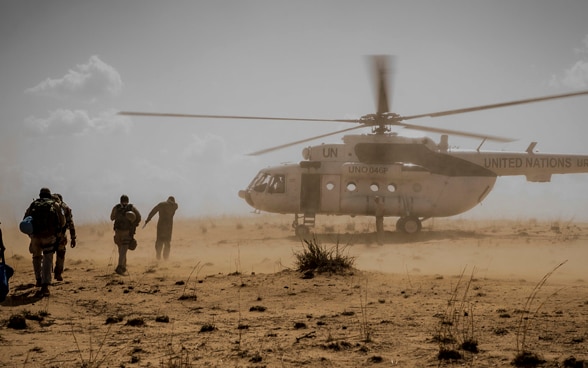Carl Emery: on a mission for peace in Mali
Carl Emery (52), an officer in Geneva's cantonal police force, has been working on his first mission in Africa since October 2020. He is a member of the FDFA's Swiss Expert Pool for Civilian Peacebuilding and runs projects that aim to reform Mali's national security institutions. The programme is in keeping with the commitment to multilateral peace efforts emphasised by Ignazio Cassis on his visit to the country at the beginning of February. Read on for a first-hand account.
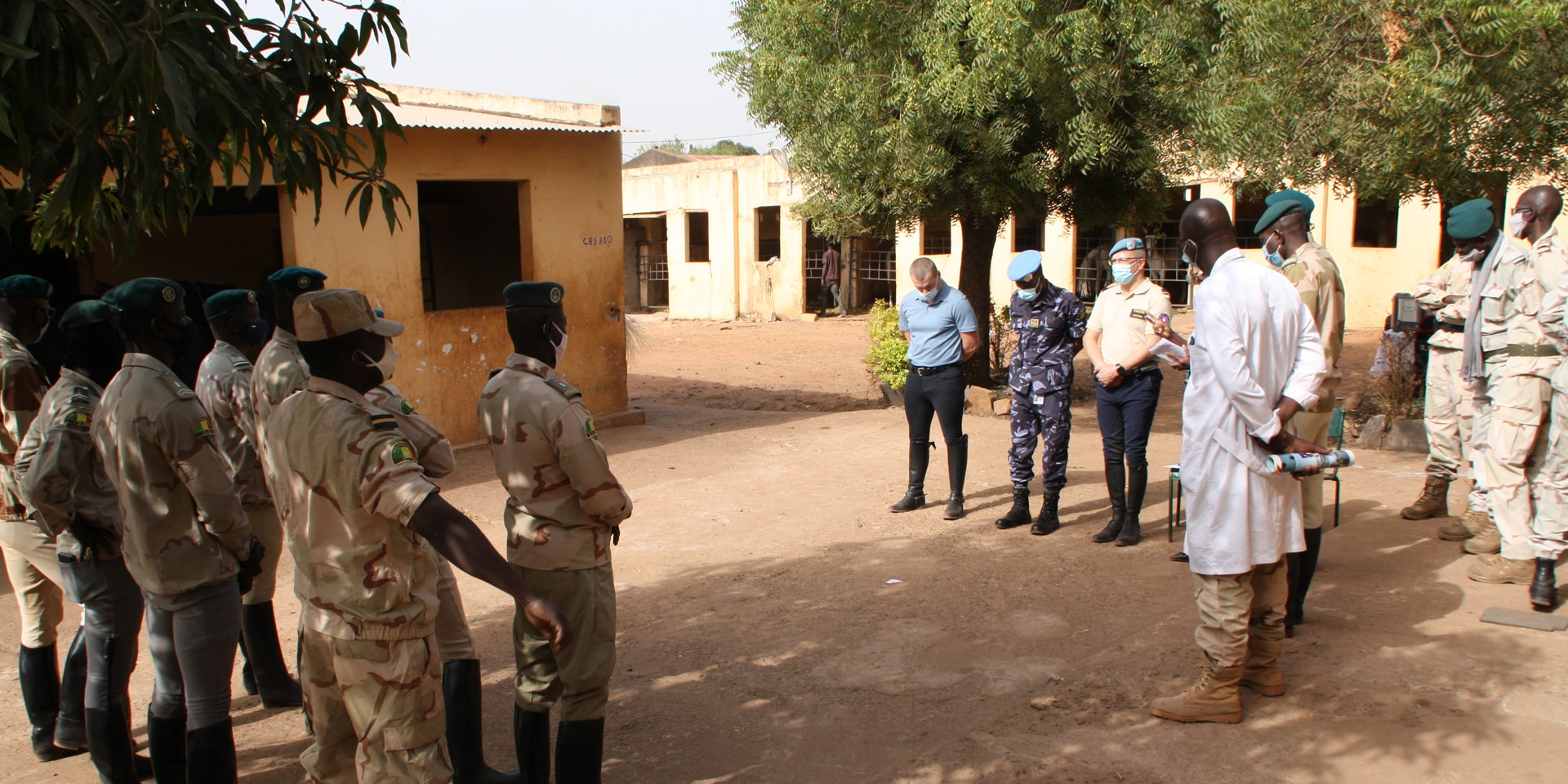
Carl Emery, light brown shirt and black trousers (right) gives instructions to the Malian equestrian brigade. © Carl Emery
In a neighbourhood of Bamako, Carl Emery steps out of his door. He looks around and sees a few children playing with a ball, training, and practising various sports in the street. While they lack the necessary equipment, their determination to burn off some energy is in no doubt. Carl walks over for a closer look, strikes up a conversation and decides to help them out. Thanks to his contacts, he is able to provide them with training equipment including boxing gloves, tatami mats and other essentials to encourage their interest in combat sports.
In 1994, Carl won the gold medal at the full-contact kickboxing world championships, having already won the European championships twice. Some 26 years later he is still active in martial arts, but mainly for the benefit of others. When he's not working on the official mission that brought him to Bamako, he always finds the time to train local children in martial arts, determined to help them communicate through sports. "Practising sports such as martial arts allows you to bring together different communities that don't necessarily know each other," Carl explains. "I saw it in Ireland a few years ago, I've seen it in Switzerland, and now I'm seeing it in Mali." It's plain to see that Carl is a man who enjoys sharing and passing on knowledge. It's likely also the reason he's now working as a Swiss police expert for the United Nations Multidimensional Integrated Stabilization Mission in Mali (MINUSMA).
Though he does have the stature for it, Carl Emery is no GI Joe. He is an officer who trains instructors in Geneva's cantonal police force and, since October 2020, has been on secondment to the UN via the Swiss Expert Pool for Civilian Peacebuilding (SEP). The Pool comprises some 150 civilian experts, including 15 police officers, who each convey their own expertise in the field and collectively embody Switzerland's many multilateral commitments around the world.
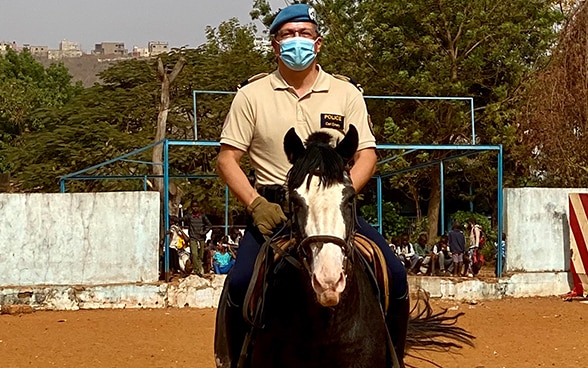
Carl's work training cavalry units in Mali
As part of MINUSMA, Switzerland currently has seven police experts deployed in Mali – a major provision of personnel to a peacekeeping mission for a country like Switzerland. As one of these experts, Carl has been advising the national police force and gendarmerie in the Bamako region since October 2020. Both in their areas of responsibility and more generally, the experts ensure that local law enforcement agencies are operational and that their actions and procedures respect human rights; they provide substantial technical support and valuable assistance in training agents.
Carl works as an instructor at Mali's national police and gendarmerie schools, and is involved in a number of specialised fields ranging from civil protection to training in various intervention techniques. Carl's role and his mission in West Africa are a challenge he is tackling head on. The 52-year-old is currently training Mali's new mounted police unit – squads of cavalry officers who will provide much-needed help with public security and community policing assignments in a region that is 75% desert. "Before we arrived, cavalry units in Mali were only deployed in ceremonial contexts, for example to accompany the president or at major national events," Carl explains. "But they were never used in operational manoeuvres in the field. Our mission is to train mounted gendarmes so that they can operate in more than just official ceremonies."
The creation of this new mounted response unit in Mali makes sense: it expands the police's public presence across a much larger area, bringing numerous communities in villages far from the capital of Bamako into contact with law enforcement agents. "This is something that's never been done before," Carl explains. "Even though horses offer a cheap and extremely convenient way to access areas without driveable roads." Not only is horseriding convenient, it also has a very long history. Mali's well-established equestrian tradition stretches back to the Mali Empire, which controlled much of the Sahel region in the 14th century and used horses as an easy means of travelling around the territories it had acquired. The national gendarmerie has been inspired in its efforts by this rich heritage, as well as by the experience of the MINUSMA experts present in Mali.
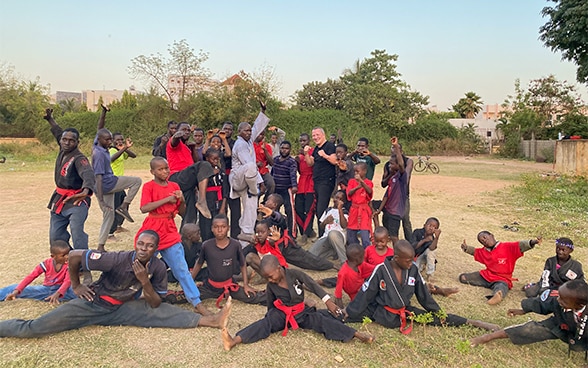
Sharing expertise between Geneva and Bamako
The canton of Geneva also has a mounted police unit that is tasked with maintaining public safety and keeping order. As in Mali, it is used to reinforce the community policing presence in each commune. Carl Emery knows it well: indeed, his extensive experience in his local area helped pave the way for his involvement with the FDFA's Swiss Expert Pool and deployment to Mali. Sharing expertise with his counterparts in Bamako also allows Carl to enhance the reputation of Geneva's cantonal police force. Robert Tanner, director of human resources at Geneva's Department for Security, Employment and Health, which includes the police force, explains: "It's a source of pride for us that we've managed to set up a mounted unit in Geneva, and that some of our agents have attained such a level of expertise that they can, quite humbly, export that knowledge abroad."
Sharing experience isn't just a one-way street: Carl Emery's mission in this extraordinarily diverse environment has taught him some valuable lessons and given him food for thought in his own development as a police instructor in Geneva. In a country of conflicting realities, there are still certain similarities with Switzerland. For example, Mali is divided into regions in which different lingua francas and ethnicities dominate – and where gifted teachers can thrive. "There are no centralised solutions in Mali," says Carl. "If you ask a Bambara officer from Bamako to enforce the law among the Tuaregs in Kidal, around 1,500km north-east of the capital, things are going to get complicated. They barely speak the same language and generally see themselves as separate peoples." There can be no doubt that the expertise Carl is bringing to Mali is helping to consolidate personal skills and social competences, reinforcing qualities such as inventiveness, open-mindedness, the sensitivity to forge solid links with peers, and the ability to find efficient solutions. "The experience is a big shock to the system, and a wonderful challenge."
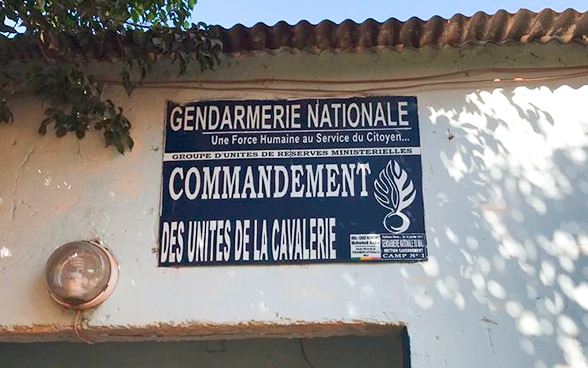
Increased collaboration with the cantons
Switzerland does not have a single national police force. As a result, annual deployments of police officers are organised via a systematic collaboration whereby the Confederation draws on the respective talent pools of the country's various police forces. The process creates a relationship of trust between the different authorities. "The police of Geneva are very sensitive to the international context and peacekeeping efforts. There's a real enthusiasm for collaborating on this programme," Robert Tanner explains. "It opens up a lot of possibilities, particularly for young officers who want to give a sense of purpose to their life and their mission."
Three officers from Geneva have embarked on peacekeeping missions since the end of 2020 – the first since Switzerland's commitments in Kosovo and Rwanda in the 1990s. "The work isn't very visible, but it's extremely valuable," says Carl Emery. "The fact that our police force lets us go shows considerable open-mindedness. Our management is aware of the added value it brings to Geneva's police force, particularly because missions abroad improve personal skills and social competences. I think we'll help a good few people find their calling." For the officers, the work is a source of personal pride: they know they are doing their part to support Switzerland's interests and, in turn, the country's foreign policy strategy.
Switzerland's work with the UN
Through its Swiss Expert Pool for Civilian Peacebuilding (SEP), Switzerland provides police experts to the UN and a number of other international organisations. The experts are tasked with helping national police forces to protect the victims of conflicts and strengthen the rule of law. These deployments help implement the objectives of the International Cooperation Strategy 2021–24. They also demonstrate Switzerland's desire to support political processes that aim to prevent or resolve conflicts.
A commitment to support peace and security around the world is one of the thematic focus areas of the FDFA's Foreign Policy Strategy 2020–23. As a neutral country, Switzerland aims to promote its values, defend its interests and build bridges.
To that end, it is applying to join the UN Security Council for the period 2023–24. As an elected member of the world's leading body for the promotion of peace and security, Switzerland would be able to implement its foreign policy objectives, contribute to peace and security, and work to support multilateralism.

